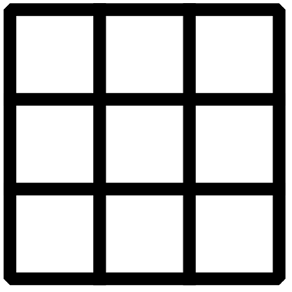I Like Rectangles, But Not Squares

The figure above shows 9 unit squares stacked to form a
3
×
3
square.
How many non-square rectangles are there in this figure?
Bonus : Generalize this for an n × n grid.
The answer is 22.
This section requires Javascript.
You are seeing this because something didn't load right. We suggest you, (a) try
refreshing the page, (b) enabling javascript if it is disabled on your browser and,
finally, (c)
loading the
non-javascript version of this page
. We're sorry about the hassle.
1 solution
The general solution for an n × n grid is
( 2 n + 1 ) 2 − k = 1 ∑ n k 2 = 1 2 n ( n − 1 ) ( n + 1 ) ( 3 n + 2 ) .
Log in to reply
What is n?
I don't get further then 16 by handcounting. What do i forget? There are 3 rectangles of dimension 2×1, 3 of 3×1 and 2 of 2x3. This is 8. Doing this makes 16 because i can count these again by turn ing the square 90 degrees
Log in to reply
There are 6 of dimension 2 x 1, (2 on each horizontal row), so by your approach there are a total of 2 ∗ ( 6 + 3 + 2 ) = 2 2 non-square rectangles.
For the counters: 1. vertical row: 2 times 1×2, 1 time 1×3, 2. vertical row: 2 times 1×2, 1 time 1×3, 3. vertical row: 2 times 1×2, 1 time 1×3,
- horizontal row: 2 times 1×2, 1 time 1×3,
- horizontal row: 2 times 1×2, 1 time 1×3,
- horizontal row: 2 times 1×2, 1 time 1×3,
and 4 times 2×3 rectangles.
What is "4C2" I don't get it!!!!!!
Log in to reply
The binomial coefficient nCk, i.e., ( k n ) , is the number of ways of choosing k objects from a set of n distinct objects, (order is not important).
In this case we are choosing 2 of the 4 horizontal lines and 2 of the 4 vertical lines. Each of these ( 2 4 ) ∗ ( 2 4 ) = 6 ∗ 6 = 3 6 choices "frame" a unique rectangle within the given grid. From these 3 6 rectangles we then subtract the 14 squares to get the final answer.
Any 2 small squares dont form rectangle only adjacent do! According to me
The number of rectangles can be found out by using counting techniques. Total rectangles will be 4C2*4C2 = 36. But out of these there ate some squares. Squares are 1^2 +2^2 + 3^2 = 14. Therefore, total non square rectangles are 22.